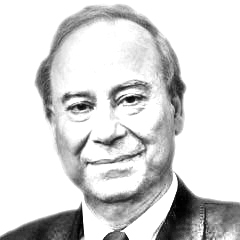The debate about Jinnah’s vision of Islam rarely raises the question, who shaped his Islam? It is a genuine line of enquiry because the man widely known as secular and liberal transformed to lead a movement that would go on to create Pakistan. Thus the question of the origins of Jinnah’s Islam is not merely a theoretical one, but one with practical implications for an entire nation.
Tackling the conundrum leads us to the great Islamic poet-philosopher Allama Iqbal. The following excerpts from my book Jinnah, Pakistan and Islamic Identity, provide an insight into Jinnah’s relationship with Iqbal, shedding light on how Jinnah won over the Muslims of India before he won them a nation.
In the last years of Iqbal’s life, just before his death in 1938, there was a series of fascinating interactions between him and Jinnah. Iqbal seemed to be drawing Jinnah into his world, and Jinnah seemed to be moving inexorably towards it. There seems to have formed between them a spiritual connection that resulted in the passing of the flame from one to the other.
The eight letters Iqbal wrote to Jinnah between 1936 and 1937 and Jinnah’s foreword to them help us to understand the relationship. In his foreword Jinnah calls Iqbal “the sage, philosopher and national poet of Islam,” acknowledging his role as a spiritual mentor.
In a letter written on 21 June 1937, shortly before he died, Iqbal identified Jinnah as the leader Muslims had been waiting for: “You are the only Muslim in India today to whom the community has a right to look up for safe guidance through the storm which is coming to North-West India, and perhaps to the whole of India.”
It was a rare coming together of the man of action and the man of ideas; but in Iqbal and Jinnah they had become one in their vision of a modern Muslim nation. That vision would lead to the creation of the largest Muslim nation in the world in 1947
Inner secrets of the self, esoteric mysticism, hidden meanings, definitions of divinity- these were all outside Jinnah’s intellectual domain and held little real interest for him. He was a pragmatist, the lawyer preparing his brief thoroughly and presenting it with skill. Yet Jinnah in his foreword to the correspondence expressed his unanimity with Iqbal: “His views were substantially in consonance with my own and had finally led me to the same conclusions as a result of careful examination and study of the constitutional problems facing India.”
Iqbal’s letters clearly are not concerned simply with “constitutional” matters. They discuss culture, society and, of course, politics-in fact the destiny of his people, the Muslims. They also reflect Iqbal’s links with Sufism. So when Jinnah stated that his own views were in “consonance” with Iqbal’s he was referring not only to Iqbal’s constitutional ideas but to his broader philosophic convictions. Clearly Jinnah was conceding far more than perhaps even he realized.
Iqbal’s influence on Jinnah is revealed in Jinnah’s speeches from 1937 onwards. It is no coincidence that later in the same year Jinnah referred to the “magic power” of the Muslims in his presidential address to the All-India Muslim League at Lucknow. The word “magic,” redolent of mysticism, is not a word that we associate with Jinnah. Until now he had spoken of separate electorates, minority representation and constitutional safeguards. Now he would use Islamic symbolism to represent Pakistan.
Consider the bravura speech he made when presiding at a historic meeting in 1940 at Lahore. Tracing the history of the two communities as mutually separate cultural and religious entities, he emphasized the point by using a cultural rather than legalistic argument: the cow that the Hindus worship, Jinnah says, Muslims eat, the villains that Hindus malign, Muslims idolize- and so on.
When Pakistan was created and he delivered his first two speeches to the Constituent Assembly in 1947, Jinnah once again echoed the themes of a tolerant, compassionate, decent society, one reflecting the time of the holy Prophet of Islam. He reflected the essence of Iqbal’s cultural arguments for a separate state.
In a hard-hitting letter to Jinnah written on 28 May 1937, Iqbal asked: “How is it possible to solve the problem of Muslim poverty?”
Jinnah echoed Iqbal in his presidential address at the thirtieth session of the All-India Muslim League at Delhi, on 24 April 1943 when he gave “a warning to the landlords and capitalists who have flourished at our expense by a system which is so vicious.” He added, “They have forgotten the lesson of Islam…. There are millions and millions of our people who hardly get one meal a day. Is this civilization? Is this the aim of Pakistan?”
Jinnah was probably the first All-India Muslim leader who was specifically referring to economic issues, as Iqbal had advised him. It explains why, in spite of all the orthodox Muslim propaganda against him-that he was not sufficiently a practicing Muslim, that he could not even say his prayers properly in Arabic, that his actions were un-Islamic, that he could not speak Urdu-Jinnah came to be acknowledged by his followers as the Quaid-i-Azam.
At the height of the Pakistan movement, in the middle of a hectic schedule, in December 1944 Jinnah paused to pay tribute to Iqbal who he called “our National Poet..” and “… the interpreter and voice of Islam.”
It was a rare coming together of the man of action and the man of ideas; but in Iqbal and Jinnah they had become one in their vision of a modern Muslim nation. That vision would lead to the creation of the largest Muslim nation in the world in 1947.
The writer is an author, poet, filmmaker, playwright, and is the Ibn Khaldun Chair of Islamic Studies, American University in Washington, DC. He formerly served as the Pakistani High Commissioner to the UK and Ireland. He tweets @AskAkbar
Published in Daily Times, December 30th 2017.
